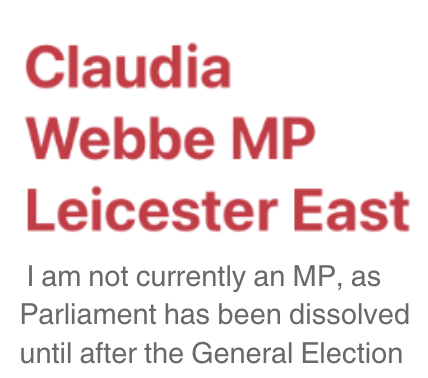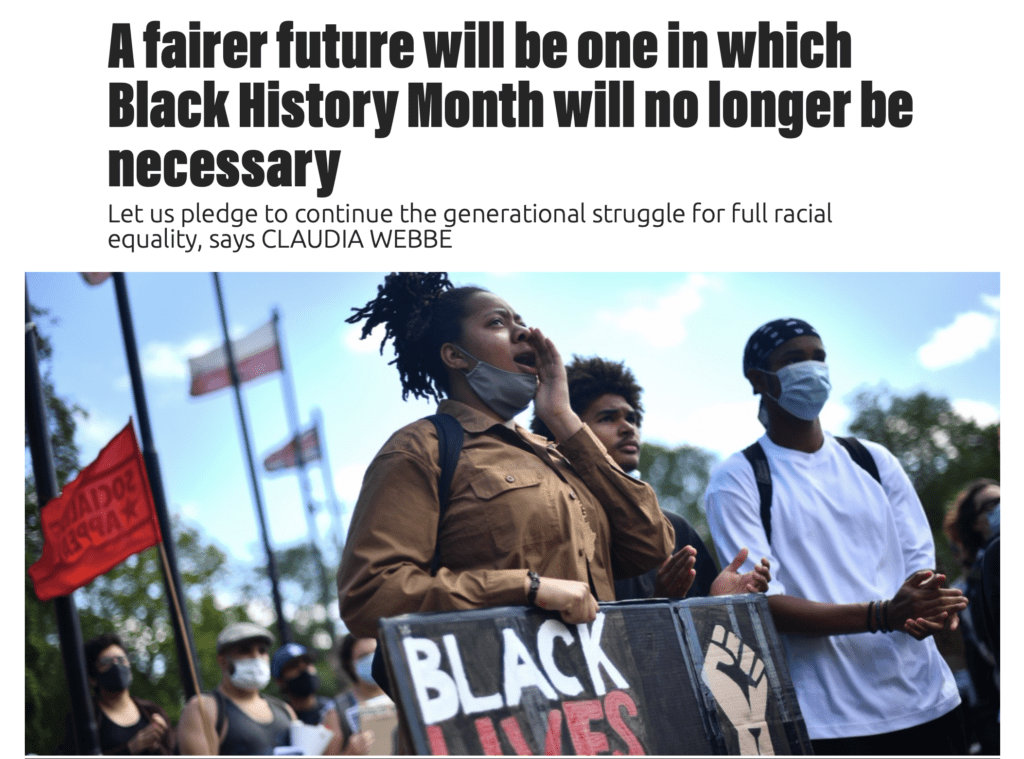A fairer future will be one in which Black History Month will no longer be necessary
By Claudia Webbe MP
Let us pledge to continue the generational struggle for full racial equality, says CLAUDIA WEBBE
A STARK reminder of the importance of Black History Month was delivered the day before it began.
Last week, during the shambolic first US presidential debate, Donald Trump repeatedly failed to condemn white supremacists.
He even implied that the Proud Boys, a far-right extremist group, should “stand by” to monitor the protests which have sprung up against racist police brutality.
Sadly, this normalised tolerance for racism extends to Britain. In the same week as Trump’s latest racist comment, it was reported that Home Secretary Priti Patel had proposed processing people seeking asylum in Britain on Ascension Island — which is 7,109 kilometres away from Britain. This is an inhumane, racist proposition.
It was also recently revealed that the 18-month-long Windrush compensation scheme has seen the Home Office pay out just £1.3 million across 168 cases — which accounts for just 11 per cent of claims lodged since April 2019.
The Windrush scandal was an unacceptable travesty, which denied black British residents their basic legal rights.
The official inquiry into the scandal concluded that it was caused by institutional failures to understand race and racism.
If recent events are anything to go by, the government has learnt no lessons from this scandal.
Across the world, racism and the far right are on the rise. It has never been more important for us to learn from the history of racial oppression and to end the injustices that exist to this day.
During the Black Lives Matter movement, we’ve rightly seen renewed calls for our schools to teach the true brutal history of the British empire and the legacy of imperialism, colonialism and racism which continue today to have a generational impact.
As we reflect on the Black Lives Matter movement in the wake of brutal police killings, it is crucial to recognise that Britain has been central to the historical subjugation of African-Americans.
It is estimated that, until the Abolition of Slavery Act in 1833, Britain transported some 3.1 million Africans, around 25 per cent of all slaves, to its colonies in the Caribbean, North America and elsewhere.
And when the British empire did abolish slavery in 1807, it provided 46,000 slave-owners — among them the ancestors of David Cameron, George Orwell and Graham Greene — with today’s equivalent of £17 billion.
The British government only paid off its obligations to former slave-owning families and organisations in 2015.
Until then, black British taxpayers are amongst those who have been paying to compensate those that imprisoned our ancestors.
Present-day global inequalities remain permanently shaped by the horrors of extractive colonialism and racialised subordination.
This Black History Month, former colonial powers must begin to recognise and repair the historical damage upon which their prosperity was built.
One example is the unacceptable instances of appalling murder and violence at the hands of the British state that have been erased from present-day memory of empire.
Nowhere is this clearer than in Kenya. There is a collective amnesia in Britain regarding British torture camps in 1950s Kenya, where members of the Kikuyu tribe were systematically tortured, starved, beaten, mistreated and raped, as well as the massacre of the Sotik people where 1,800 men, women and children were murdered in a colonial land-grab.
Across Kenya, the rest of Africa and other regions forced to endure the injustice of colonialism, indigenous communities were systematically alienated from their rightful lands.
This historical injustice laid the groundwork for decades of uneven development and corporate extraction.
Yet these massacres have been airbrushed from British history. There has never been any form of apology, and no reparations ever offered for acts of historic genocide, including the Jallianwala Bagh (Amritsar) Massacre of 1919, where over 2,000 people were shot in a single afternoon.
The brutality of modern racism in Britain cannot be separated from this history.
This perverse legacy continues to affect us in all walks of life, from police use of force to unfair immigration detentions to the disproportionate number of black children who go to bed hungry.
The crucial question facing us this Black History Month is what does it mean to transform Black Lives Matter from a crucial slogan to a reality of daily life?
This means reforming Britain’s racist criminal justice system.
This means justice for the victims of racialised state violence, including Grenfell Tower and the Windrush Generation.
It means that when a black person dies in police custody — as they disproportionately do — the incident is thoroughly investigated and the police involved face justice.
It means transforming our British education system to teach the true and enduring history of colonialism, imperialism and the transatlantic slave trade.
It means an end to racist policies like no recourse to public funds and the hostile environment.
Ultimately, it means an end to neoliberal capitalism, which enshrines racial inequality at home and abroad.
This Black History Month let us pledge to continue the generational struggle for full racial equality.
Let us resolve for our history to be taught all year round. And let us fight for a fairer future in which this important month will no longer be necessary.
Claudia Webbe MP is the member of Parliament for Leicester East. You can follow her at www.facebook.com/claudiaforLE and twitter.com/ClaudiaWebbe



